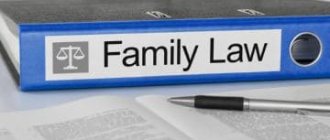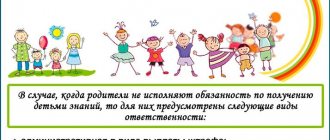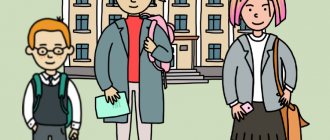Family Code - rights and responsibilities of parents. Reasons for occurrence
The Family Code establishes the rights and responsibilities of parents quite clearly. The rights and responsibilities of parents arise from the moment the baby is born, that is, even before the birth certificate is issued. As a general rule, parents need to register the fact of the birth of a child no later than 30 days from the moment of a joyful event in the family.
Personal rights and responsibilities of parents may not arise immediately, but after months or years. For example, when paternity (maternity) is established in court by conducting appropriate examinations.
Russian legislation protects motherhood and childhood (Article 38 of the Russian Constitution).
The Basic Law of the country establishes that raising and ensuring a decent life is an equal right and responsibility of mom and dad.
The legislation of the Russian Federation divides the rights and responsibilities of parents into property and non-property.
The property rights and responsibilities of parents and children are the right of children to financial support until adulthood, and the responsibility of parents to support minors.
Personal non-property rights and responsibilities of parents:
- the obligation to raise one’s child, as well as the right to decide in what ways to raise a minor;
- the duty to take care of the health of children;
- the duty to educate the child, with the right to choose an educational institution and the desired program for education;
- duty to protect children without obtaining any permission.
Equality of rights and responsibilities of parents: This issue mainly begins to be raised by parents during or after the divorce process. In our country, as a rule, a minor remains with his mother (although there are many examples of fathers successfully raising children). If a man understands his full responsibility to the child, then after the divorce he continues to take care of him, otherwise the mother has the right to legally receive alimony by court decision if a corresponding statement of claim is filed in court. The father also has the same right, provided he lives together with the children in relation to the negligent mother of minors. A mother or father who is unable to live with a child due to life circumstances has the right to take direct part in all areas of the child’s life.
Do you need help from a family law specialist?
Sign up for a consultation with the practice manager!
+7
Presentation "Rights and responsibilities of parents" presentation for a lesson on the topic
Slide 1
Municipal educational budgetary institution secondary school No. 6 of Yugorsk “Rights, duties and responsibilities of parents (legal representatives)” Parents’ meeting
Slide 2
developing a responsible attitude towards the upbringing of their children among parents of students; teach parents the ability to correctly use parental rights. Target:
Slide 3
A child learns from what he sees in his home: parents are an example of this. P.I.Pidkasisty
Slide 4
UN Convention on the Rights of the Child; Constitution of the Russian Federation; Family Code of the Russian Federation; Criminal Code of the Russian Federation; Federal Law “On Education in the Russian Federation”; Administrative Code of the Russian Federation; Basic laws, regulations
Slide 5
Article 18. Parents have general and primary responsibility for the upbringing and development of the child. They are obliged to think about the interests of the child first.
Slide 6
Article 38. Motherhood and childhood, the family are under the protection of the state; 2. Caring for children and raising them is an equal right and responsibility of parents; Article 43 1. Everyone has the right to education. 4. Basic general education is mandatory. Parents or persons replacing them ensure that their children receive basic general education.
Slide 7
Chapter 4. Students and their parents (legal representatives): Article 43. Duties and responsibilities of students; Article 44. Rights, duties and responsibilities in the field of education of parents (legal representatives) of minor students
Slide 8
Article 43. For failure to comply with or violation of the School Charter, internal regulations and other regulations, disciplinary measures may be applied to school students - reprimand, reprimand, expulsion from the educational institution. By decision of the School and with the consent of the KDN and ZP for repeated commission of disciplinary actions, expulsion of a minor student who has reached the age of 15 is allowed.
Slide 9
Article 44. 1. Parents (legal representatives) of minor students are obliged to ensure that their children receive a general education.
Slide 10
Article 44. 6. For failure to fulfill or improper fulfillment of duties established by this Federal Law and other federal laws, parents (legal representatives) of minor students bear responsibility under the legislation of the Russian Federation.
Slide 11
Chapter 12. Rights and responsibilities of parents Article 56. The child’s right to protection; Article 63. Rights and responsibilities of parents regarding the upbringing and education of children; Article 65. Exercise of parental rights; Article 69. Deprivation of parental rights; Article 77. Removal of a child in the event of an immediate threat to the child’s life or health.
Slide 12
Article 56. The child’s right to protection The child has the right to protection of his rights and legitimate interests. 2. The child has the right to protection from abuse by parents (persons replacing them). 3. Officials of organizations and other citizens who become aware of a threat to the life or health of a child, a violation of his rights and legitimate interests, are obliged to report this to the guardianship and trusteeship authority at the place of the child’s actual location.
Slide 13
Article 63. Rights and responsibilities of parents regarding the upbringing and education of children Parents have the right and obligation to raise their children. 2. Parents are obliged to ensure that their children receive basic general education and create conditions for them to receive secondary (complete) general education.
Slide 14
Article 65. Exercise of parental rights Parental rights cannot be exercised in conflict with the interests of the children. Ensuring the interests of children should be the main concern of their parents. All issues related to the upbringing and education of children are resolved by parents by mutual consent based on the interests of the children and taking into account the opinions of the children.
Slide 15
Article 69. Deprivation of parental rights Evasion of parental responsibilities; Abuse of parental rights; Child abuse; Chronic alcoholism, drug addiction. Article 77. Removal of a child in the event of an immediate threat to the life of the child or his health 1. In the event of an immediate threat to the life of the child or his health, the guardianship and trusteeship authority has the right to immediately remove the child from the parents (one of them) or from other persons in whose care he is.
Slide 16
Chapter 16. Crimes against life and health Article 125. Leaving in danger Chapter 20. Crimes against family and minors Article 156. Failure to fulfill obligations to raise a minor
Slide 17
Article 125. Leaving in danger Knowingly leaving without help a person who is in a condition dangerous to life or health. The minimum penalty is a fine of 80,000 rubles; The maximum penalty is imprisonment for up to 1 year.
Slide 18
Article 156. Failure to fulfill the duties of raising a minor Failure to fulfill or improper performance of the duties of raising a minor by a parent or other person entrusted with these duties, as well as by a teacher or other employee of an educational institution. The minimum penalty is a fine of 100,000 rubles; The maximum penalty is imprisonment for up to 5 years.
Slide 19
Article 2. Basic concepts 1. For the purposes of this Law, the following concepts are used: children - persons under the age of 18 who are on the territory); night time - from 22 to 06 local time in the period from October 1 to March 31; from 23:00 to 06:00 local time from April 1 to September 30; persons carrying out activities involving children; places prohibited for children to visit - objects (territories, premises) of legal entities or citizens engaged in business activities (bars, pubs); places prohibited for children to visit at night are public places, including streets, stadiums, parks, squares, public transport vehicles, objects (territories, premises) of legal entities or citizens engaged in business activities.
Slide 20
Article 9. Measures to monitor the attendance of children in general education institutions 2. A general education institution monitors the attendance of students and pupils in classes provided for by the curriculum, in accordance with the charter of the educational institution. Parents are required to inform the educational institution within three hours of the reason why the child did not start classes; If the reason for a child’s absence from classes is not valid, and the parents do not take measures to return the child to the educational institution, the educational institution must notify the KDN and ZP about this fact; KDN and ZP takes measures against students who do not attend lessons and parents who do not fulfill parental responsibilities, in accordance with the legislation of the Russian Federation. 5. The parents (legal representatives) of the child are responsible for his upbringing and receipt of general education in accordance with federal legislation.
Slide 21
For failure to fulfill or improper fulfillment of parental responsibilities, as well as for committing offenses against their children, parents bear administrative, criminal and other liability. Conclusion:
Slide 22
“Parents, only parents, have the most sacred duty to make their children human beings, while the duty of educational institutions is to make them scientists, citizens, members of the state at all levels. But whoever has not become a man first of all is a bad citizen. So let’s work together to make our children human...” V.G. Belinsky
Slide 23
Take care of children, take care, ward off evil spells from them, give happiness, joy, care - take care! Take care of your children, take care: Have pity on them, cherish them, love them And teach others to love them - Take care! Take care of your children, take care of them: Keep them from adversity and loss, Take their sorrows for yourself - Take care of them!
Slide 24
Thank you for your attention!
Rights and responsibilities of parents and children
The rights and responsibilities of parents and children have their own boundaries, which are enshrined in Article 65 of the RF IC. The rights of mom and dad cannot be exercised contrary to the interests of their children. Personal non-property rights and obligations of parents and children, as well as property ones, cannot be implemented contrary to the interests of the children. Parents are responsible for the physical and moral condition of their children and do not have the right to infringe on them by causing bodily harm and causing moral suffering.
The rights and responsibilities of parents and children are prescribed in the RF IC.
Article 61 of the RF IC stipulates that the rights and obligations of parents and children end when their children reach the age of 18, register a marriage before reaching the age of majority, as well as their emancipation (gaining legal capacity before the age of 18). However, there are certain exceptions to the general provisions of family law (limitation or deprivation of rights). It is worth noting that deprivation of rights does not mean deprivation of obligations towards a son or daughter. A parent is deprived of his responsibilities only in the event of adoption of his child. In this situation, the rights and responsibilities of adoptive parents become the only legal ones to the child.
Also, in accordance with the provisions of family law, obligations to provide financial support for children can be extended by the court if the child has reached the age of 18 and is disabled due to disability of groups 1 or 2. These are the basic rights and responsibilities of parents and children.
Child's rights. Basic documents
Galina Novikova
Child's rights. Basic documents
Basic documents:
-Declaration of the Rights of the Child (1959)
.
-UN Convention on the Rights of the Child (1989)
.
-World Declaration on the Survival, Protection and Development of Children (1990)
.
In our country, in addition to these documents , a number of legislative acts have been adopted.
-Family Code of the Russian Federation (1996)
.
-Law “On Basic Guarantees of the Rights of the Child in the Russian Federation ”
.
-Education Act
.
The listed documents proclaim the fundamental rights of children : to a name, citizenship, love, understanding, material security, social protection and the opportunity to receive an education, develop physically, mentally, morally and spiritually in conditions of freedom. Particular attention is paid to the protection of children's rights . It is stated that the child must receive timely assistance and be protected from all forms of neglect, cruelty and exploitation.
Legislative acts recognize every child - regardless of race, skin color, gender, language, religion, political or other beliefs, national, ethnic and social origin - the legal right to education, development, protection, active participation in the life of society. The rights of the child are linked to the rights and responsibilities of parents and other persons responsible for the lives of children, their development and protection.
Art. 65 clause 1 of the Family Code states that “parental rights cannot be exercised in conflict with the interests of the children. Ensuring the interests of children. Ensuring the interests of children should be the main concern of their parents . When exercising parental rights, adults do not have the right to harm the physical and mental health of children or their moral development. Methods of raising children must exclude neglectful, cruel, rude, degrading, treatment, insult or exploitation of children.
Every child , in accordance with the norms of domestic and international law , has the following rights and freedoms in the field of family relations:
- live and be raised in a family;\
- know who his parents are;
- to live together with them (except when this is contrary to his interests)
and care on their part;
- to be raised by parents, and in their absence or deprivation of parental rights - to be raised by a guardian, trustee or child care institution;
— for comprehensive development;
- respect for human dignity;
- to communicate with parents, grandparents, brothers, sisters, and other relatives; This right is also reserved for a child in an extreme situation, that is, in a pre-trial detention center, hospital, etc.;
- for protection;
- to express one’s own opinion;
- to receive a surname, name, patronymic;
- to obtain funds, subsistence and own income.
Advice for parents.
The child is not to blame for anything in front of you. Not that he was born. Not that it created additional difficulties for you. Not that it didn't meet your expectations . And you have no right to demand that he solve your problems.
A child is not your property, but an independent person. right to decide his fate, much less ruin his life at your own discretion . You can only help him choose a path in life by studying his abilities and interests and creating conditions for their implementation.
Your child will not always be obedient and sweet. His stubbornness and whims are as inevitable as the very fact of his presence in the family.
You yourself are to blame for many of your child's whims and pranks . Because they didn’t understand him in time. They spared their time and energy. They began to perceive it through the prism of unfulfilled hopes and simply irritation. They demanded from him what he simply could not give you - due to his age or character. In short, they didn’t want to accept him as he was.
You must always believe in the best that is in the child . To the best that will still be in it. Do not doubt that sooner or later this best will certainly manifest itself. And remain optimistic in all pedagogical adversities.
Marriage age
The exact definition of “marriage” is not established by Russian legislation. The Family Code of the Russian Federation defines the main principles of a marriage union: this is the voluntariness of marriage of two persons of different sexes, as well as the coming of age of the future spouses.
Marriage age is a limit established by the laws of the Russian Federation, upon reaching which a man and a woman are free to enter into a union.
As a general rule, this is when persons creating a family reach the age of majority, namely 18 years.
However, there may be exceptions to this rule of law in the form of reducing the age of marriage. Thus, Article 13 of the RF IC establishes that, in the presence of extenuating circumstances, municipal authorities may grant permission to marry to persons whose age at the time of filing the application is at least 16 years old (as a rule, due to pregnancy confirmed by a medical certificate). Also, exceptional circumstances are recognized if there is a threat to the life of one of the minors who wants to get married (for example, the presence of a fatal disease), as well as the orphanhood of minors who want to enter into a marriage, provided they do not have guardians.
But even 16 years is not the limit for reducing the marriageable age, because in exceptional cases, the age of marriage may be reduced by the laws of the constituent entities of Russia. To date, 18 regions of the Russian Federation have taken advantage of this right.
Realization of parents' rights
Both mother and father are subjects of the exercise of rights in relation to their children (Article 61 of the RF IC). Even if the parents are not legally married or have a joint household, they are equal in the exercise of their rights.
The fulfillment of rights by parents is integrally connected with the minor in relation to whom the rights of the parent are exercised, and also in one situation or another is connected with the activities of other persons who are participants or specific guides in the implementation of rights (for example, guardianship and trusteeship authorities, educational institutions, law enforcement and courts).
From the analysis of Russian legislation, we can identify mandatory criteria under which parents can freely exercise their rights: recognized by the court as parents and their data included in the birth certificate; have reached 16 years of age; are not deprived (limited) of parental rights.
The problem with many broken families is that children become the bargaining chip in parental disputes. Forgetting about the feelings of their children, mothers and fathers, trying to take out their grievances on each other, forbid the child to communicate with each other, avoid providing financial support for the children, and make independent (without the participation of the other parent) decisions.
If parents do not come to a joint consensus in resolving issues related to the maintenance, upbringing and place of residence of children, then disagreements can only be resolved through civil proceedings, and only based on the interests of minors.
If the legal representative prevents the child from spending time together with the other parent, then the latter can legally appeal such actions in court, having previously contacted the guardianship and trusteeship authorities, who can subsequently confirm in court the fact of the obstacle to the parent in the exercise of his rights.
If at the time of consideration of the civil case the child has reached 10 years of age, the court is obliged to listen to his opinion on the current situation and in relation to the parents.
If the father and mother do not come to a common denominator regarding the financial support of the child, they have the right to resolve this dispute in court. With the help of the court, the legal representative of the minor with whom the child lives can recover alimony both in the amount of part of the earnings of the other parent and in a fixed amount.
If one of the parents becomes aware that the upbringing of the other parent is contrary to the interests of the child, and also causes physical and moral suffering to the minor, he has the right to resolve in court the issue of limiting or depriving the rights of such a parent, as well as imposing child support obligations on the latter.
Law enforcement agencies and commissions for minors consider applications (from parents or other persons) about improper exercise of parental responsibilities and take appropriate measures.
However, a family for a child is the best thing parents can give for him. Parents, as legal representatives of a minor, must come to mutual agreement on all issues relating to the child and exercise their rights without prejudice, first of all, to their children, as well as to each other.
Release from rights and obligations
When a child reaches the age of majority, parents are immediately and automatically released from their rights and obligations.
It is understood that a new member of society is already quite capable of independently choosing a place of study, earning a living, and so on. In addition, parents are not obliged to continue to support and raise a child if he entered into an official marriage before reaching adulthood. A new unit of society has been created, and members of the new family will independently decide how to build a life together. However, such release of parents from further responsibility for the child does not equate to judicial deprivation of parental rights.









